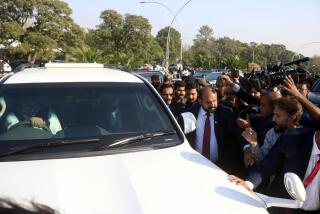Silenced Pakistani lawyer is speaking out
- Share via
LAHORE, PAKISTAN — For the first time in three months, Aitzaz Ahsan was back in his study Tuesday, surrounded by bound volumes of U.S. Supreme Court rulings, photos of himself clashing with riot police, and television cameras ready to catch his first words to the outside world after a long, enforced silence.
He wasted no time getting to the point.
“The best option for Musharraf is that he should quit,” Ahsan declared, referring to the man who had ordered him confined and muzzled since November.
That would be Pervez Musharraf, the president of Pakistan and now a severely weakened leader whose allies in the parliament were for the most part defeated at the polls Monday. The resounding defeat set off noisy celebrations across the country but also, more quietly, sprang the lock that had kept Ahsan under harsh conditions of house arrest.
A celebrated lawyer, Ahsan was shut away in jail and then in his home here for speaking out against Musharraf’s six-week emergency rule late last year and for defending Pakistan’s popular chief justice, whom the president had summarily dismissed.
The crackdown on Ahsan turned this distinguished, articulate man into a national hero, a prisoner of conscience whose confinement, in the eyes of many, symbolized the arrogance and highhandedness of Musharraf’s rule.
The first sign of easing restrictions on Ahsan came about 9 p.m. Monday when his cellphones began ringing after months of being blocked. Then, the official minders assigned to keep watch on him inside his home failed to turn up Tuesday morning, allowing him access to his study.
Although police still prevented him from venturing outside, by late afternoon Ahsan was besieged by journalists. He spent the next few hours adding to the swelling chorus demanding Musharraf’s resignation, warning the United States against underestimating public anger, reciting his own original poems and deprecating, without totally ruling out, the idea of being tapped to become prime minister in the expected new government.
During an interview at his home, Ahsan’s lawyerly, even tones, honed by years addressing the court, could not completely mask the anger behind some of his words.
“Musharraf is himself now the problem. He is not the solution,” he said. “I think all people who are his friends should advise him that this is the best time to bow out gracefully.”
Over the past six years, Musharraf, a former general who took power in a 1999 coup, has received unwavering support from the Bush administration, which considers him a key ally in the battle against Al Qaeda and the Taliban. But Ahsan said that Washington risked alienating the Pakistani people if it continued propping up a leader they soundly rejected at the polls.
“The West must see how singularly unpopular he is, and to try to sort of hold on to him and to help him retain his position, or to try to stitch together alliances supportive of [former] Gen. Musharraf, would mean that the West has learned nothing and is still going against the tide,” Ahsan said.
“We are with the West in the fight against terror, but the real weapon in that fight . . . is an empowered people with enforceable rights.”
Ahsan called it “staggering” that Western nations had failed to speak up for judges who were ordered removed last year by Musharraf, apparently out of fear they would rule his presidency invalid.
Anger over his interference in the judicial system propelled thousands of lawyers into the streets, with Ahsan often in the vanguard. When the president declared a state of emergency Nov. 3, Ahsan was among the first to be arrested.
Until Monday night, he was held virtually incommunicado, writing melancholy verse in Urdu “about the dreams we saw of a liberal, plural, democratic and peaceful society, which military and religious extremism has rent asunder and denied to us.”
Rumors are swirling that he could be a consensus choice for prime minister. Although Ahsan, a former senator, did not run for a parliament seat, it might legally be possible to appoint him as premier.
He said Tuesday that he supports another Pakistan People’s Party stalwart for the post. But ultimately, “who the prime minister will be will be decided by my party.”
“I hope there will be a Pakistan People’s Party prime minister. Second, I hope that the PPP and the other major political party . . . will see eye to eye and work as coalition partners. The third thing I wish to see is the restoration of the judges illegally thrown out by a military commander.
“That done,” the lawyer with the big agenda said with a laugh, “I want to take a three-month holiday.”
--
More to Read
Sign up for Essential California
The most important California stories and recommendations in your inbox every morning.
You may occasionally receive promotional content from the Los Angeles Times.














